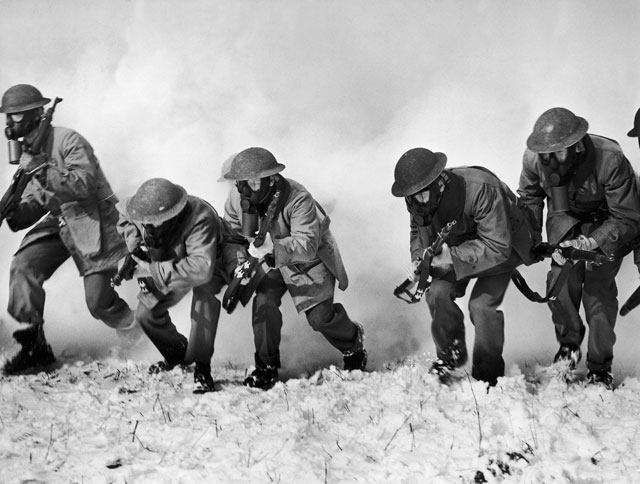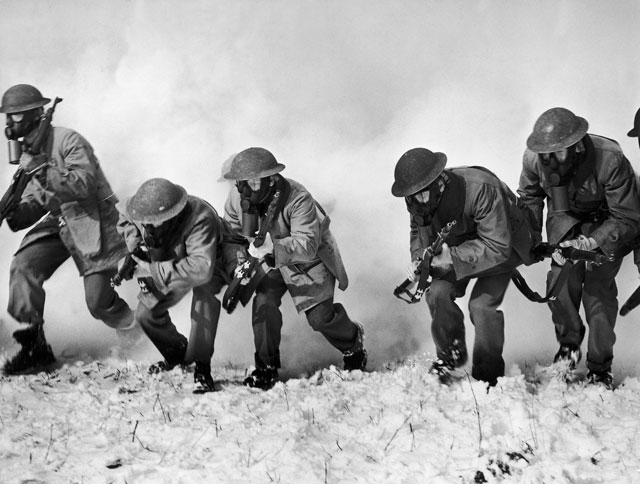
 Soldiers are shown racing through a smoke screen, to which tear gas had been added by surprise to test their powers at detecting its presence, during a drill at Fort Dix, New Jersey, in 1941. They also were given a sniff of four world war gases — phosgene, chloropicrin, mustard and lewisite. (Photo: Keystone-France / Gamma-Keystone via Getty Images)
Soldiers are shown racing through a smoke screen, to which tear gas had been added by surprise to test their powers at detecting its presence, during a drill at Fort Dix, New Jersey, in 1941. They also were given a sniff of four world war gases — phosgene, chloropicrin, mustard and lewisite. (Photo: Keystone-France / Gamma-Keystone via Getty Images)
When we think of the harm that befalls soldiers during wartime, specific images come to mind. The fallout from scientific experiments — especially those carried out by our own government — isn’t one. But that was the reality of tens of thousands of military men in the 1940s, who were poisoned with mustard gas by the U.S. government to see how their bodies would react. It took decades to bring to light the vast scope of the experiments, and it couldn’t have been completed without the work of two NPR journalists.
For years, veterans were sworn to secrecy about the tests, prohibited from even discussing them with doctors. While this curtain was lifted in the 1990s, and Congress and the U.S. Department of Veterans Affairs promised medical care and services, many vets didn’t get it. NPR reporter Caitlin Dickerson and research librarian Barbara Van Woerkom found records for and called hundreds of vets who were used in these experiments, and their work paved the way for the men — who are now well into their 80s — to receive the care and recognition they needed.
Dickerson was new to the investigative desk when she began working with Van Woerkom, who’d been gnawing around the edges of the story for years. She said she understood right away the urgency of what Van Woerkom was sitting on. “There was also this element of time, because most of the men who were used in these tests had died, and those who were still around were in their 80s or 90s,” she said. “It felt sort of dire.”
Dickerson started calling them. Because the men were older, communication was sometimes difficult. But they finally started opening up. They told her about their skin flaking off, about chronic health problems they couldn’t fully report to their doctors. Many hadn’t even told their wives about the experiments.
“Some of them said, ‘I just can’t believe that the government did this to me. I trusted them. I trusted that they weren’t going to hurt me,'” said Van Woerkom.
The pair set off to see if they could prove, systematically, that the government failed to keep the promise to get these vets care. They dug through the VA’s medical benefits database and found a pattern: In denied claim after denied claim, the VA asked the vets for more proof that they were actually involved in the experiments — proof they didn’t have, because the tests were classified.
The journalists found more disturbing information. In testing to see how different races would react to the poison, the military used Japanese-American soldiers as stand-ins for enemy soldiers — something Dickerson said struck her. “Some of them were recruited out of internment camps,” she said, only to be used “as guinea pigs on the frontlines of a chemical war.”
The journalists asked the VA why it had contacted only 610 veterans in the 20 years since the tests were made public, and officials said they’d done the best they could. But in only two months of research, Dickerson and Van Woerkom had found double that number.
Their reporting brought about change. After the story aired, Sen. Claire McCaskill, D-Mo., proposed a bill requiring the VA to reexamine all claims made by vets used in mustard gas experiments. It was signed into law last August.
Join us in defending the truth before it’s too late
The future of independent journalism is uncertain, and the consequences of losing it are too grave to ignore. To ensure Truthout remains safe, strong, and free, we need to raise $27,000 in the next 24 hours. Every dollar raised goes directly toward the costs of producing news you can trust.
Please give what you can — because by supporting us with a tax-deductible donation, you’re not just preserving a source of news, you’re helping to safeguard what’s left of our democracy.